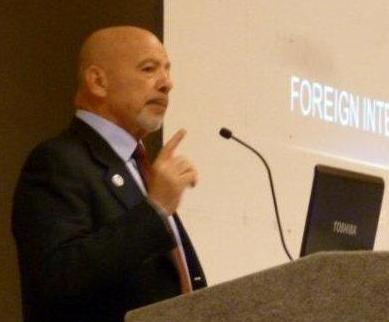<<< إبني العميد الركن عقيل هاشم ( إسماعيل وإياد هاشم ) .يرفعان علم الثورة السورية على برج إيفل في باريس ، اسماعيل يعيش في فرنسا أما إياد فقد ترك عمله في فيلادلفيا وسافر إلى باريس يوم أمس للإشتراك بهذا العمل الجرئء ، وقد تم إعتقالهما من قبل البوليس الفرنسي ثم أفرج عنهما بعد ثماني ساعات
وضع علم كبير للثورة السورية ظهر يوم الجمعة7-27-2012 على برج إيفل، أبرز المعالم السياحية في باريس "للفت نظر العالم إلى الوضع في سوريا". فقد توجهت مجموعة صغيرة من ناشطي هيئة "فرنسا سوريا ديمقراطية" إلى هذا البرج الذي تجرى فيه تصليحات. وارتقى ناشطان هما نجلا الضابط السوري المتقاعد عقيل هاشم الذي يعيش في الولايات المتحدة، على سلمين وأفردا العلم الكبير على مرأى من السائحين الذين صفقوا لهما لدى نزولهما. وقد توتر الوضع لحظات عندما أراد حراس البرج نزع العلم. من جهة أخرى، كتب المتظاهران على لافتة "21 ألف قتيل و65 ألف مفقود ومليونا مهجر.. هذه هي الإصلاحات الإجرامية التي وعد بها بشار الأسد". وقال الناشط إبراهيم وتي لوكالة الصحافة الفرنسية إن "برج إيفل هو رمز فرنسا.. جئنا إلى هذا المكان الذي تؤمه أعداد كبيرة من السائحين، حتى نلفت نظر العالم إلى ما يجري في سوريا".
Two Syrian opposition activists unfurled an enormous rebel flag at the base of the Eiffel Tower in Paris on Friday and were arrested by police.
As a handful of supporters from the France Syria Democracy group rallied below, the two activists climbed scaffolding set up for maintenance works and released the flag, to applause from tourists gathered below.
The two activists, Ismael and Iyad Hashem -- sons of retired Syrian brigadier general Akil Hashem who lives in the United States -- were arrested after climbing down, following a complaint from the site’s management, police said.
“The Eiffel Tower is the symbol of France. We came here because there are a lot of tourists and we want to attract the entire world's attention to what is happening in Syria,” said one of the activists, Ibrahim Wetti.
The flag they unfurled was the one adopted in 1946 after Syria first gained independence, which was later replaced by the country's Baathist regime.
Related Articles:
http://english.alarabiya.net/articles/2012/07/27/228759.html
http://en.ria.ru/world/20120727/174812436.html
http://www.aljazeera.net/news/pages/c8d0372a-e617-4034-8522-66449772a650?GoogleStatID=9#.UBLgGi-z3Zs.facebook.html
http://paris-ile-de-france.france3.fr/2012/07/27/un-drapeau-syrien-en-guise-de-soutien-accroche-sous-la-tour-eiffel-60541.html
Related Articles:
http://english.alarabiya.net/articles/2012/07/27/228759.html
http://en.ria.ru/world/20120727/174812436.html
http://www.aljazeera.net/news/pages/c8d0372a-e617-4034-8522-66449772a650?GoogleStatID=9#.UBLgGi-z3Zs.facebook.html
http://paris-ile-de-france.france3.fr/2012/07/27/un-drapeau-syrien-en-guise-de-soutien-accroche-sous-la-tour-eiffel-60541.html












